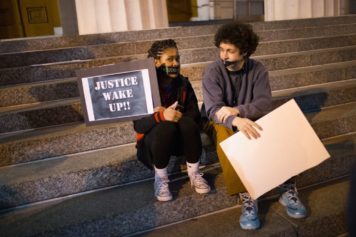
WASHINGTON, DC – NOVEMBER 16: U.S. Attorney General Loretta Lynch announces a major civil settlement at the Justice Department November 16, 2015 in Washington, D.C. (Photo by Chip Somodevilla/Getty Images)
After the city council voted to amend the proposed consent decree it had reached with the federal government following negotiations — citing concerns the agreement would be too costly — U.S. Attorney General Loretta Lynch announced the lawsuit, which as the Guardian reported was filed even before the nation’s top law enforcement official began speaking.
The 56-page civil rights lawsuit alleges that the conduct of law enforcement in Ferguson violated the First, Fourth and 14th Amendments of the Constitution, as well as federal civil rights law.
In a press conference — accompanied by Vanita Gupta, Assistant Attorney General and head of the DOJ civil rights division — Attorney General Lynch said that nearly a year ago, the DOJ had released the findings of its investigation into the “expansive and deliberate” violations of the Ferguson Police Department. And she concluded that this was a distressed community “in which residents felt alienated from their own police force.”
They violated the Fourth Amendment by stopping people without reasonable suspicion, arresting them without cause and using unreasonable force. They made enforcement decisions based on the way individuals expressed themselves and unnecessarily escalated non-threatening situations. These violations were not only egregious – they were routine. They were encouraged by the city in the interest of raising revenue. They were driven, at least in part, by racial bias and occurred disproportionately against African-American residents. And they were profoundly and fundamentally unconstitutional. These findings were based upon information received from Ferguson’s own citizens, from Ferguson’s own records and from Ferguson’s own officials. And they demonstrated a clear pattern or practice of violations of the Constitution and federal law.
Further, the attorney general pointed out that after announcing the findings, DOJ had long, “painstaking negotiations” with the city of Ferguson lasting 26 weeks, making it clear it wanted to avoid litigation. However, Lynch added, it was understood that after the Justice Department had reached a fair, cost-effective agreement with Ferguson’s negotiators, they would be forced to go to court to protect the rights of the city’s residents if the city council rejected the decree. Further, saying that the DOJ was sensitive to the cost concerns in Ferguson, her department offered free assistance to the city throughout the process.
“The residents of Ferguson have waited nearly a year for their city to adopt an agreement that would protect their rights and keep them safe. They have waited nearly a year for their police department to accept rules that would ensure their constitutional rights and that thousands of other police departments follow every day. They have waited nearly a year for their municipal courts to commit to basic, reasonable rules and standards,” Lynch said. “But as our report made clear, the residents of Ferguson have suffered the deprivation of their constitutional rights — the rights guaranteed to all Americans — for decades. They have waited decades for justice. They should not be forced to wait any longer,” she added.
“We intend to aggressively prosecute this case, and I have no doubt that we will prevail,” Lynch said.
The city of Ferguson had raised seven objections to the proposed consent decree, as the Guardian reported, which would have compelled the city to agree to changes in its policing, pay for a federal monitor that would oversee its police and court systems, and raise salaries for police and other city employees. Ferguson Mayor James Knowles III claimed the financial toll for the city would be disastrous. Further, as the Huffington Post reported, the agreement included mandating rigorous police training, the use of de-escalation tactics rather than the use of force, and engagement by city officials with residents of color who were victimized and harassed by police. This comes after Ferguson agreed to reduce the traffic fines and court fees it collected from its poor and Black residents, in what amounted to a profit center, a veritable ATM for the city.
Although Ferguson officials raised concerns about the price tag of the agreement with the Justice Department, no such cost concerns were raised when city funds were being used to pay police to break the law and abuse Black people, or when military tanks and teargas were used to brutalize peaceful protesters. And yet, it seems there are never sufficient funds for the enforcement of civil rights, or to ensure justice is served. As for the officials of the city of Ferguson, they will soon learn the true cost of going up against the U.S. Department of Justice in federal court.

